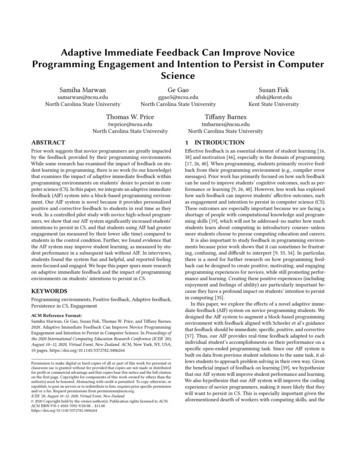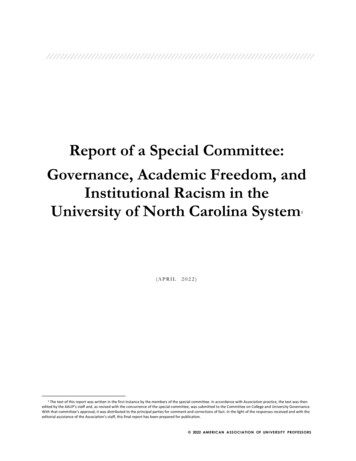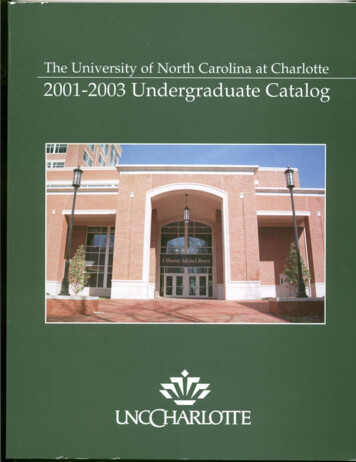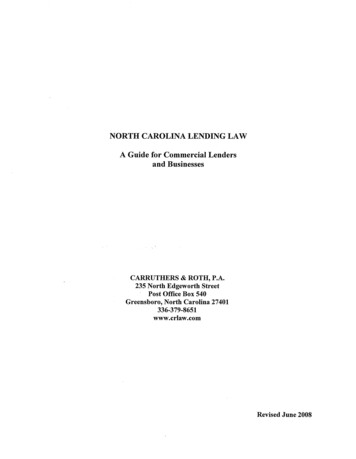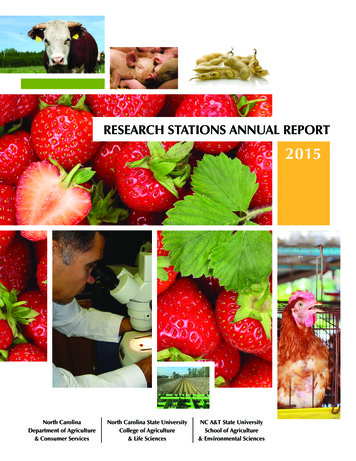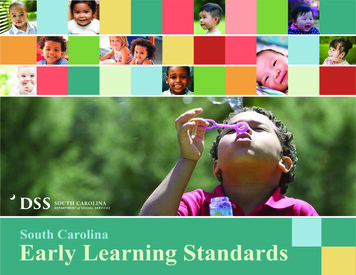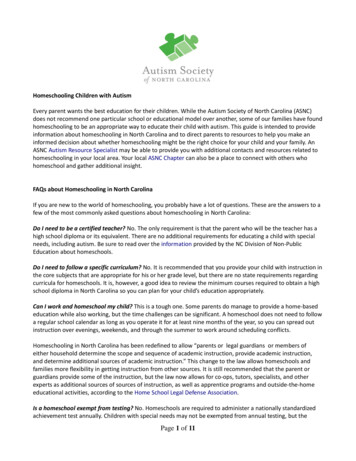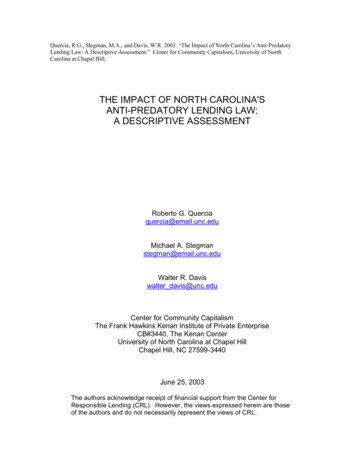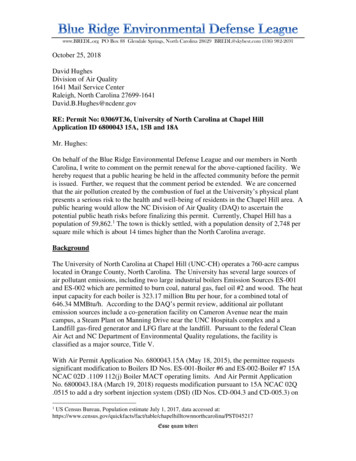
Transcription
N o r t h Ca r o li n a S t a t e U n ive r s i t yFall 2014H E A F a ll N e w s l e tte rHEA F ALL N EWSLETTERL E TTE R F RO MINSIDE THIS ISSUE:Student Spotlights2Alumni Spotlight3UGSA Updates3ASHE 20144NCCPA 20144PREP Program5Doctoral Student Award5Discussing Student Trends6HEA Faculty Dinners6Professional Development7Doctoral Research Award7Class of ‘14 Reflections8Alumni Resume Critiques9Engagement Updates9Student AccomplishmentsSpring Meeting TimesJanuary 12th, 4:30 p.m.February 16th, 4:30 p.m.March 16th, 4:30 p.m.April 13th, 4:30 p.m.HEA Online!Visit our Website!Catch up on Facebook!Read our Blog!Follow our Twitter!10THEPRESIDENTDear students, faculty, staff, alumni, and friends:NC State’s Higher Education Association is wrapping up another semester ofprofessional development with some of the most devoted, determined, and talentedstudents on campus. We could not continue our legacy of achievement without yoursupport, and we thank all of you who have lifted us up this year. Some highlights of ourfall semester included the fourth annual Careers in Student Affairs Month panel, anexciting new fundraiser called Dinner with Faculty, and participation in the UniversityGraduate Student Association Feed the Pack food drive. We are also proud to haverevised the Association’s mentoring program, now called Pack Pals, into a cohesive andstructured model that benefits both the mentors and mentees alike. Engagement effortshave continued to bring our cohorts closer together, and have included tailgates, trivianights, a Halloween celebration, and much more.We are privileged to have outstanding advocates for our program in so many capacities,and two events from this semester encapsulate the activity of our students and faculty.Once again, the Higher Education Association was awarded the Best Practices grantfrom the North Carolina Career Development Association (NCCDA). Additionally, thePREP Coordinating Committee welcomed prospective students from diverse andtraditionally underrepresented backgrounds to campus as part of their effort to recruitqualified graduate students. Our program is growing stronger each semester due totireless efforts like these, and we thank all of you who have advocated for our programin the past year.We have many accomplishments to celebrate, but the promotions of two of ourmentors to full professors certainly deserves recognition here. Please take time tocongratulate Dr. Audrey Jaeger and Dr. Paul Umbach on their achievements in serviceto the profession and university. We are so proud of them and feel incredibly blessed tobe right here under their wings.Thanks to all of you who have followed us on social media! We are excited to unveilour new Instagram account, so please follow us at NCSUhigheredassociation and staytuned for pictures at our meetings, engagement events, conferences, and more.Spring semester is right around the corner, and we eagerly anticipate continuing ourcollaborative efforts to lift up the students and faculty within our program. RecruitmentWeekend, conference season, and so much more awaits us in 2015, and we know it willbe a great year for the Wolfpack. Thank you again for helping make our program theamazing community it is.-Nathan Thomas, Class of 2015
P age 2H E A F a ll N e w s l e tte rD O CT O R AL S P O T L IG H T : R AC H E A L BRO O K SRacheal Brooks is a Visiting Lecturer of Spanish atNorth Carolina Central University in the Departmentof Language and Literature and with the Division ofExtended Studies. She is a third-year, full-timedoctoral candidate in the Educational Research andPolicy Analysis program at North Carolina StateUniversity with a specialization in Higher EducationAdministration. Her research interestsinclude: policies and practices associated with theinstruction of Spanish at historically Black collegesand universities (HBCUs); second language learnerbeliefs; online instruction; online curriculumdevelopment; and minorities in Spanish languagestudies and instruction.“I have come to trulyappreciate how the skillsgained from doctoraltraining and thesubsequent productionof scholarly knowledgeare both critical andpersonally compelling.”Racheal decided to pursue a doctoral degree ineducational research as a result of challengesfaced in the teaching environment. As an instructorof Spanish at multiple institutions, she found thatthere were inconsistencies in the approaches tocurriculum development, the creation of programand student learning outcomes, and theassessment of students. Simultaneously, several ofthese programs endeavored to redesign existingSpanish-language programs as a result ofundesirable student performance and lowenrollment in upper-level courses. Through herwork, she realized that she would be mostbeneficial in the effort to improve student successin Spanish-language education if she gained adeeper understanding of program development andassessment, theories regarding adult learners,organizational structures and operations, andpolicies related to higher education. As a result,the Educational Research and Policy Analysisprogram was a perfect fit for her needs.Racheal is currently in the process of interviewingstudents and collecting additional data for herdissertation research. Her goal is to defend herdissertation in the upcoming spring semester andshe anticipates graduating in May 2015. Aftergraduation, Racheal plans to continue her work asa Spanish instructor and increase her involvementin the growth of NCCU’s distance educationprogram through her role as a member of theDistance Education Advisory Council. Rachealstates, “With the knowledge I have gained fromthe doctoral program, I can serve as a resource forinstructors as they transition from face-to-face tohybrid and online courses.”MASTER’S SPOTLIGHT: DONTÉ MCGUIREDonté McGuire is asecond-year studentin the HigherEducationAdministrationmaster's program.Throughout the fall2014 semester, hehas been serving asan intern in the Gay,Lesbian, Bisexual, andTransgender (GLBT)Center on campus,where he’s had theopportunity to assumea key leadership rolein coordinating thecenter’s Ally VisibilityVideo Project. Donté also had the opportunity toserve on the steering committee for HEA's PREPProgram this semester. Over the course of thisexperience, he was able to work closely with theHigher Education Administration program’sleadership, Dr. Tiffany Davis, doctoral studentShauna Morin, and fellow master’s student CliffJones. Being part of planning the PREP Programallowed him to explore how theory and practiceconverge to inform the critical work of increasingstudent diversity in a graduate program.Donté plans to pursue a doctoral degree in highereducation upon graduating from the master’sprogram. He initially decided to pursue a doctoraldegree to advance his knowledge and think moredeeply and critically about many of the concepts hewas introduced to as a master’s student. Dontéstates, “Having worked five years in the field ofeducation, I was admittedly biased towardspractitioners as more critical to pursuing socialjustice. However, I have come to truly appreciatehow the skills gained from doctoral training and thesubsequent production of scholarly knowledge areboth critical and personally compelling.”He is interested in researching issues of equity andinclusion within the field of higher education,particularly as it relates to marginalized populations.More specifically, he’d like to analyze how crossdifference understanding and appreciation can beused to provide more equitable and inclusivecampus environments for gender, sexual, racial andethnic minoritized communities.Donté is currently applying to doctoral programs andhopes to receive the good news this spring that hehas been admitted to a program and can continuehis education as a full-time Ph.D. student.
H E A F a ll N e w s l e tte rP age 3ALUMNI SPOTLIGHT: DR. SEAN JENKINSDr. Sean Jenkins, an alumnus of the HigherEducation Administration master’s program, iscurrently serving as the Senior Assistant to thePresident at the University of Virginia. Dr. Jenkinsseemingly fell into higher education, as many inthe field often do. He graduated from Wake ForestUniversity with a Bachelor of Arts in English andimmediately pursued a career in consulting. Afterrecognizing that his consulting career wasn’tproviding the challenge he desired, Dr. Jenkinscontacted Dr. Audrey Jaeger about the HigherEducation Administration master’s program at NCState.While pursuing his master’s degree, Dr. Jenkinswas charged with coordinating the first-everRecruitment Weekend for the program. Inaddition, he served as a teaching assistant withDr. Jaeger, had a graduate assistantship at DukeUniversity, and held an internship at UNC-ChapelHill. These varying and exciting opportunities werethe catalysts that led him to his current position.The emphasis on mentorship and professionalconnections in the program were a major part ofhis success.After leaving NC State, he found a new home inCharlottesville working at the University of Virginia,where he earned a Ph.D. in Higher Education.Upon completion of his doctoral work, Dr. Jenkinswas given the opportunity to serve as the SeniorAssistant to the President. While at UVA, Dr.Jenkins has seen major changes sweep throughthe university community, such as the growingconcern of sexual assault on college campusesand the politics behind selecting the Board ofVisitors. In his role, Dr. Jenkins continuallyadvocates for reform in cost of attendance tobetter support the multitude of out-of-statestudents.Dr. Jenkins spoke to the Foundations of HigherEducation and Student Affairs class this semesterand had these words of advice for currentstudents:U G S A U P DA T E SThe University Graduate Student Association is offto a roaring start this fall! Under the direction ofPresident David Fiala, UGSA put together their firstever fee proposal for the NC State University’s FeeCommittee to ensure that the graduate studentvoice was represented in decisions about whichstudent fees to raise over the next three years.This semester, campus partners have informedUGSA of new services for graduate studentsincluding group counseling for graduate studentsand a young professionals group through the GLBTCenter. Thesis and Dissertation Support Serviceshosted a Fall Dissertation Institute, and a bootcamp to provide inspiration for gettingdissertations started (and finished!). UGSA eveninvited a HEA alumna to speak at a meeting this Be mindful of the politics of your office andinstitution, especially in such a smallcommunity as in higher education andstudent affairsIf you have the time and means to pursuea Ph.D., do it. Achieving a doctoral degreeallows for further professionaladvancement and credibility in the fieldNew positions will lead to newopportunities; this helps build a soundprofessional reputation in the communityFind ways to fine-tune writing and publishyour workJoin a professional association fornetworking and continuing educationRemember that it takes a lifetime to buildyour reputation and a spilt second todestroy your integrity; a piece of wisdomfrom his long-time mentor LeonardSaunderssemester. Brooke Bailey presented the graduatestudent associations with a unique opportunityto get involved with University Housing in a newinitiative to support undergraduate residents intheir quest of choosing the right graduateprogram.HEA is represented on the Community ServiceCommittee this year, which is currently in themiddle of a food drive to support Feed the PackPantry, the on-campus food pantry for membersof the NC State community. Sixty graduatestudent associations are collecting items thatwill be delivered to the pantry for the holidayseason. UGSA has been working tirelessly torepresent graduate students across NC Stateand make sure all feel welcome in our WolfpackCommunity.N ee d to up dat e y ourc on ta ct i nf or ma ti on ?S en d ch an ge s toh igh er e d@ nc s u. edu.
P age 4H E A F a ll N e w s l e tte rHEA HEADSTOASHE 2014In November, the 2014 conference of theAssociation for the Study of Higher Education(ASHE) took place in Washington, DC with animpressive number of NC State representativesin attendance, including faculty, and masters’and doctoral students. Their participationincluded a variety of presentations on topicssuch as rural, African-American high schoolstudents and college access; remediation andcollege access; transgender undergraduateexperiences; and the experiences of STEMpostdoctoral fellows. In addition to presenting,some students and faculty attended editorialboard meetings like that of the Review of“This year, theNCCPA conference washeld at NC State’sFriday Institute andHEA students took fulladvantage of theopportunities providedfor professionaldevelopment,networking, andleadership development.”INDCHigher Education; others met with mentors, menteesor project collaborators; or they networked for futureprofessional opportunities. Becky Crandall and TaraHudson represented NC State in the ASHE Dash 5k,and several students stayed one extra day to attendan IPEDS workshop co-sponsored by ASHE and theAssociation for Institutional Research (AIR).On the first evening of the conference, NC Statefaculty, students, alumni, future students, andfriends gathered at the NC State reception toreconnect, enjoy tasty desserts (including freshlymade donuts), and to celebrate the promotions of Dr.Audrey Jaeger and Dr. Paul Umbach to fullProfessor. At the reception, Dr. Jaeger and Dr.Umbach were surprised with a series ofcongratulatory videos from colleagues acrossthe country, as well as a collection of handwritten notes from current students. TheDepartment Head, Dr. Mary Ann Danowitz,noted many successes of the program in thelast year. Among them were four outstandingdissertation awards received by recent alumniof the Higher Education program, all of whomwere under Dr. Jaeger’s advisement.Congratulations again, AJ and Paul!2 0 1 4 N C C PA C O N F E R E N C EATNC S TATE(YPAR). Hudson and Means employed YPAR toengage young people as co-investigators ofcollege access and success barriers forunderrepresented populations in highereducation. First-year doctoral student CallieWomble presented on leadership strategies forgraduate students and new professionals, anda cohort of third-year doctoral students sharedtheir stories in a panel discussion titled,“Transitioning to the Doctorate: ManagingMultiple Identities in Pursuit of a Ph.D.” ThomasGreene and Shauna Morin presented“Engagement of Graduate Students in StudentThe North Carolina College Personnel AssociationAffairs: Advancing Citizenry and Interdisciplinary(NCCPA) is the state branch of the nationalCooperation,” informed by their collectiveAmerican College Personnel Association (ACPA) andexperiences as teaching colleagues for theprovides an excellent venue for graduate studentsFoundations of Higher Education and Studentto hone presentation skills in a relatively intimateAffairs course at NC State. They used thesetting. This year, the conference was held at NCcourse as an example of communityState’s Friday Institute and HEA students took fullengagement at the graduate level, and as aadvantage of the opportunities provided forspringboard for a larger conversation about theprofessional development, networking, andopportunities and challenges faced when tryingleadership development. Current studentsto integrate engaged practices into graduaterepresented HEA at the conference by serving ascoursework. Current and former HEA studentshosts for an ice cream social reception andalso participated in Pecha Kucha sessions, anproviding ongoing assistance as greeters.innovative presentation style where informationis shared through a 20-slide in 20 seconds perAn exemplary number of current students andslide format.alumni presented at the conference, as well. In acollaborative presentation with high school studentsMany thanks to the HEA students whofrom Elon Academy, Tara Hudson and Darris Meansrepresented our program at NCCPA by‘13 highlighted a promising scholarly practicevolunteering and presenting!known as Youth Participatory Action Research
H E A F a ll N e w s l e tte rP age 5S E C O N D A N N UA L P R E PPROGRAM IS A SUCCESSThe Higher EducationPREP program, nowin its second year, isan initiativeconducted inpartnership with theGraduate School atNC State to enhancerecruitment ofqualified graduatestudents, particularlythose from diverse ortraditionallyunderrepresented minority (URM) backgrounds. PREPprovides prospective master’s and doctoral studentswith a unique opportunity to learn more about the HEAprogram and to receive guidance for preparing acompetitive application for admission.This November, we hosted seventeen PREPparticipants on campus representing an array ofinstitutions, professional experiences, researchinterests, and personal backgrounds. The PREPvisitation weekend was packed full of events designedto facilitate interactionamong and betweenparticipants, currentstudents, programfaculty, and universityadministrators. It beganwith a welcome dinnerthat was filled withintroductions, laughter,and relationshipbuilding. The followingday, our departmenthead, Dr. Mary AnnDanowitz, joined faculty members and programpartners in leading conversations about ortunities,and developingroles in thechangingculture of higher education. PREP participants alsospent some time interacting with current master’sand doctoral students in a panel discussion. Theday concluded with a fun-filled, potluck-style dinnerand bowling event with HEA students. The PREPprogram came to a dynamic end on Monday afterone-on-one meetings with faculty members and aclosing lunch with the Office for Institutional Equityand Diversity.One participant had this to say about the program:“NC State’s PREP program was an unforgettableexperience! While the process of completinggraduate school applications can be extremelystressful, the faculty members in the HigherEducation Administration program were welcomingand especially helpful in providing resources andtools to assist students in creating a competitiveapplication for graduate school. These interactionstruly showed just how invested the program is instudent success!”The PREP participants left campus with a clearerunderstanding of the application process, newprofessional and personal networks, and a visionfor seeing themselves here at NC State. Specialthanks to all of the master’s and doctoral students,faculty members, and program partners whohelped make this year’s PREP program a success,especially the PREP student coordinators: third-yeardoctoral student Shauna Morin, and second-yearmaster's students Donté McGuire and Cliff Jones!S H AU N A M O R I N R E C O G N I Z E D A T N C C PAEach year, the North Carolina College PersonnelAssociation honors a graduate student who has madesignificant and outstanding contributions to theirgraduate program. This year’s award was given to oneof our current doctoral students, Shauna Morin.During her three years at NC State, Shauna has takenpart in various initiatives to enhance the delivery ofthe graduate program. She has helped to shape theservice-learning curriculum of the Foundations inHigher Education and Student Affairs course formaster’s students; taken part in Preparing theProfessoriate – a highly competitive teaching programfor advanced doctoral students; and served as thegraduate assistant for the Higher EducationAdministration program. She has also played aninstrumental role in establishing the annual ScholarPractitioner Series, a professional developmentinitiative that aims to engage students, educators,and practitioners in higher education issues throughcollaboration with partners across campus.Shauna has shown “exemplary commitment toteaching, learning, and civic engagement in highereducation,” said Dr. Audrey Jaeger. We are veryfortunate to have Shauna as part of ourcommunity. Congratulations, Shauna!W e w a n t t o h e ar fr o mo u r al u m n i . P l e as e s e ndy o u r g o o d n ew s, j o bc h a n g e s, or i m p o r ta n tevents toh i g h e r e d @ n c su . e du
P age 6H E A F a ll N e w s l e tte rD R . K E V I N E AG A N D I S C U S S E S S T U DE N T T R E N D S“Dr. Eagan is agraduate of the HigherEducationAdministration master’sprogram. In aconversation with currentstudents, he cited hisassistantship and researchopportunities as some ofthe most valuableexperiences he had in theHEA program.”Dr. Kevin Eagan,Director of theCooperative InstitutionalResearch Program(CIRP) and InterimManaging Director ofthe Higher EducationResearch Institute atUCLA (HERI), recentlyvisited NC State topresent on studenttrends in highereducation. CIRP is thelongest-running andlargest empirical study of higher education in thecountry, administered through HERI. Dr. Eaganspoke to various professionals and graduatestudents in the Division of Academic and StudentAffairs (DASA) about national trends emerging inthe HERI data. He focused particularly onstudents’ cognitive and interpersonal skills,career aspirations of students, diversity andclimate-related issues on campus, and studentstressors.Dr. Eagan is a graduate of the Higher EducationAdministration master’s program. In aconversation with current students, he cited hisassistantship and research opportunities assome of the most valuable experiences he had inthe HEA program. Working as an RD gave himvaluable skills in supervising (he supervises eightprofessional employees and five graduatestudents in his current role), helped him fine-tunetime management skills, and provided aHEA FUNDRAISESWITHcommunity in his functional area to connect withabout academic and professional experiences.Dr. Eagan pursued a Ph.D. in Higher Educationand Organizational Change at UCLA directly aftercompleting his master’s degree. He was one ofonly two students in his ten-person cohort with noprofessional experience or time between degrees.He noted that this was challenging because hehadn’t been at the higher-level meetings that hismore seasoned cohort members wereaccustomed to and couldn’t relate as much of hisdoctoral work to “what was happening on theground.” However, an advantage he had wasbeing able to continue on in his academic workwith no mental break and no opportunity to lag inmotivation, as well as being able to build upon hisresearch methods training without a gap instatistics and other methods courses. Hisexperience shows that there is no perfect time topursue a Ph.D., but rather the right time dependson an individual’s skill sets and interests.Today, Dr. Eagan is grateful for the opportunitieshis work at UCLA has afforded him. The CIRP iscontinually moving forward with changing timesand will celebrate its 50th year of administrationnext year. Moving forward, the survey will focusmore on LGBTQ students and faculty members,examining the experiences of international andundocumented students, digging deeper into howstudents are financing their education, andaddressing issues of sexual assault on campus. Itis an exciting time to be in his position and we areproud to have such a distinguished professionalrepresent our program!F AC U LT Y D I N N E R Spaths and research interests. Students alsoappreciated the chance to engage with theirpeers and enjoy delicious food provided by ourfaculty. The fundraiser was a great success!Many thanks go out to the faculty hosts andguests as well as to all the HEA students whoso eagerly took part in these dinners. Thisfundraiser would not have been possible without their support and participation.This semester, HEA faculty graciously openedtheir homes to students for the HEA Dinner withFaculty fundraising event. Drs. Mary AnnDanowitz, Audrey Jaeger, and Joy Gayles hostedstudents for dinner throughout the week of October 13. Also in attendance were faculty guestsDrs. Alyssa Rockenbach, Tiffany Davis, and PaulUmbach. These dinners were a great opportunityfor students to connect with faculty outside theclassroom and to learn more about their career
H E A F a ll N e w s l e tte rP age 7UPCOMING PROFESSIONAL DEVELO PMENTE V E N T S : S C H O L A R - P R AC T I T I O N E R S Y M P O S I U MA N D P R E PA R E T H E P AC KThis fall, leaders in HEA have been busy planningseveral innovative professional developmentinitiatives designed to enhance the learningexperiences of students in our program. TheScholar-Practitioner Symposium is one suchevent, now in its second year. The second annualSymposium will bring students, faculty, andprofessionals together to present their researchon current issues in leadership, policy, and adultand higher education. We are excited to expandthe Symposium this year through the generoussupport of our program partners, Duke Universityand NC State’s Friday Institute for EducationalInnovation. Symposium partners are encouragingcolleagues throughout the Triangle to participatein this exciting opportunity for knowledgegeneration in the realm of theory-to-practice. TheScholar-Practitioner Symposium will be held onWednesday, February 4, 2015 from 5:00 p.m. –8:00 p.m. at the Friday Institute. The Call forProposals is available on our website, and will beopen until December 12. We also encouragefriends and alumni of the HEA program to registeronline as attendees for this event.Also in the lineup for the spring semester is theHigher Education program’s inaugural mockinterview event, Prepare the Pack (PTP), fundedby a Best Practices Grant from the NorthCarolina Career Development Association. Asparticipants in PTP, second-year master'sstudents will get the chance to hone theirinterview and networking skills as they preparefor the job search. The event will mirror theprocess and atmosphere of NASPA’s PlacementExchange, with students “interviewing” forpositions in their functional areas of interest ina conference-style setting. PTP participants willbe given individual feedback on theirperformance to help them prepare forupcoming interviews in our field. Localemployers and alumni will serve asinterviewers, allowing students to interact withprofessionals from around the Triangle. It isintended that PTP will ultimately be an annualoffering as part of the Master’s Capstonecurriculum, a course that facilitates students’integration of their various experiences in theHEA program.Prepare the Pack will take place on Friday,January 16, 2015 from 1:00 p.m. - 5:00 p.m. Ifany professional colleagues or alumni areinterested in serving as interviewers, pleaseemail Mary Rosage at mrosage@ncsu.edu fordetails.OUTSTANDING DOCTORAL RESEARCHA WA R D : D R . S T E P H A N Y B R E T T D U N S T A NDr. Stephany Brett Dunstan, College of Educationalumna (Ph.D., Educational Research & PolicyAnalysis ‘13) was recently named as the recipientof the 2014 Emerald/HETL EducationOutstanding Doctoral Research Award. Herdissertation, The Influence of Speaking a Dialectof Appalachian English on the CollegeExperience, was previously named Dissertation ofthe Year for our department, Leadership, Policyand Adult and Higher Education. She was alsonamed as the recipient of the Association for theStudy of Higher Education (ASHE) Dissertation ofthe Year Award in 2013.Dr. Dunstan’s doctoral research explored theinfluence of speaking a dialect of AppalachianEnglish on the college experience. This studyhighlighted the importance of considering dialectand language as an element of diversity oncollege campuses. Congratulations, Dr. Dunstan!“The secondannual ScholarPractitionerSymposium willbring students,faculty, andpr ofessionalstogether to pr esenttheir r esearch oncur r ent issues inleadership, polic y,and adult andhigher education.”
P age 8H E A F a ll N e w s l e tte rREFLECTIONSFROMRecent graduates of the master’s program inHigher Education Administration Lisa Latronicaand Nicole Thomas give us some insight into lifeafter graduation.Tell us about your current experience as a fulltime professional.“I felt very preparedcoming into the actualprofessional role - whichis a huge testament tomy experiences at NCState. Looking back, Iwas definitely the mostnervous about meeting anew group of students,especially my staff.”LL: I am currently a Residence Life Coordinatorat Colorado School of Mines, a small,specialized engineering school outside ofDenver. I absolutely love the institution, as wellas the opportunity to work with such bright andwonderful students every day! Every day bringsnew experiences and new opportunities to learn.My favorite part about being a professionalversus a grad student is that I can work more onin-depth, long term projects that I will be able tosee impact students - like renovations, mentalhealth trainings, and service-learningopportunities.NT: I work at the University of Virginia as thePrevention Coordinator. I focus specifically onsexual assault prevention and hazingprevention. It is a brand new position in theOffice of the Dean of Students charged withcreating an evidence-based comprehensiveprevention strategy that students, faculty andstaff can engage in.What expectations have been met about being anew professional? What has surprised you?LL: Being a new professional, I expected to havea learning curve, and that has definitely heldtrue. You have to adjust to a new environment,new policies and procedures, and new people.After almost six months in the position, I’mfinally starting to feel my feet back under me,but I’m definitely glad I knew about adjustingahead of time. If I’m being honest, the biggestsurprise has been the amount of free time/personal time I have as a new professional.Having gone through to grad school straightfrom undergrad, I had no idea how to fill myevenings without homework or clubs. But it’sallowed me to find different volunteeropportunities and professional developmentactivities.NT: I do appreciate only having one job to givemy full 110%. It has been a blast getting to knowothers I work with and the new city that I live in! Ilove networkin
Charlottesville working at the University of Virginia, where he earned a Ph.D. in Higher Education. Upon completion of his doctoral work, Dr. Jenkins was given the opportunity to serve as the Senior Assistant to the President. While at UVA, Dr. Jenkins has seen major changes sweep through the university community, such as the growing
